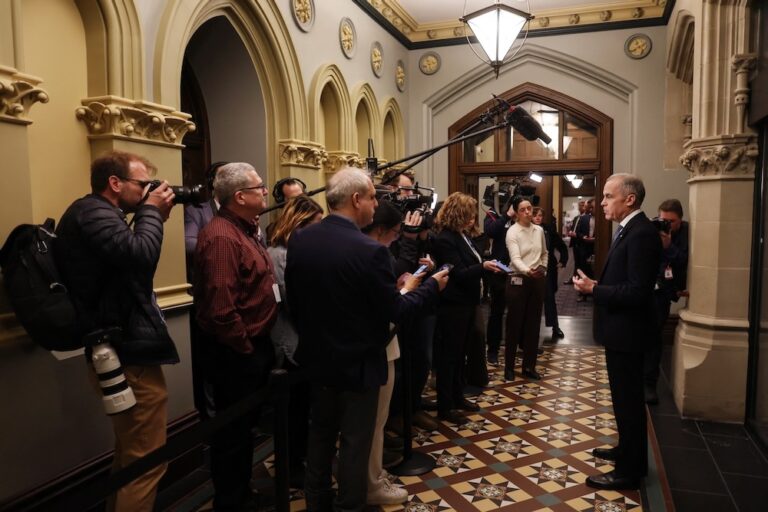They may be confused about fake news, but Canadians are pretty clear that "national security" is no excuse to force journalists to turn sources over.
This statement was originally published on cjfe.org and in CJFE’s 2016-17 Review of Free Expression in Canada.
Canadians want strong national security, and for government to leave journalistic sources alone.
We are in troubling times. The rise of fake news, and the labelling of real news as fake, has Canadians confused about what sources are reliable. We’ve also given up an unprecedented number of rights in the name of national security, but many Canadians feel this balance is correct – except when it compels journalists to turn over sources.
CJFE partnered with Nanos Research to poll Canadians about these issues, and the numbers tell a strange story. Forty-three per cent of Canadians feel the federal government is balancing national security and human rights well, while 31 per cent think there should be more emphasis on national security. Only 12 per cent feel the balance has swung too far away from human rights. At the same time, a full 70 per cent of Canadians agree or somewhat agree that journalists should not be compelled to turn over confidential information or identify sources. It seems Canadians want a strong national security apparatus, but draw a line in the sand when it comes to the government going after journalistic sources.
We also asked about fake news; the trend seems to have Canadians confused. A full 83 per cent agree or somewhat agree that the rise of fake news is making it harder to tell which outlets are legitimate, while 76 per cent of Canadians agree or somewhat agree the labelling of legitimate news outlets as “fake news” is damaging to our democratic process. This confusion around media implies a dangerous erosion of public trust in our journalistic institutions.
WE ASKED CANADIANS…
Do you agree, somewhat agree, somewhat disagree, or disagree with each of the following statements?
See a visual representation of the survey results on CJFE’s site.
1. The rise of fake news is making it more difficult to distinguish between legitimate and illegitimate information.
Agree (48%)
Somewhat agree (35%)
Somewhat disagree (9%)
Disagree (8%)
Unsure (1%)
2. The labelling of legitimate news outlets as “fake news” is damaging to the democratic process in Canada.
Agree (53%)
Somewhat agree (23%)
Somewhat disagree (9%)
Disagree (10%)
Unsure (5%)
3. Journalists should not be compelled to turn over confidential information or the identity of confidential sources to law enforcement agencies.
Agree (53%)
Somewhat agree (23%)
Somewhat disagree (9%)
Disagree (10%)
Unsure (5%)
4. When it comes to the balance between national security and protecting the privacy rights of Canadians, which of the following best reflects your personal view?
43%
The federal government is striking the RIGHT BALANCE.
31%
The federal government is putting TOO LITTLE emphasis on national security.
12%
The federal government is putting TOO MUCH emphasis on national security.
15%
Unsure
Nanos conducted an RDD redual frame (land- and cell-lines) hybrid telephone and online random survey of 1,000 Canadians, 18 years of age or older, between March 31st and April 4th , 2016 as part of an omnibus survey. Participants were randomly recruited by telephone using live agents and administered a survey online. The sample included both land- and cell-lines across Canada. The results were statistically checked and weighted by age and gender using the latest Census information and the sample is geographically stratified to be representative of Canada. Individuals were randomly called using random digit dialling with a maximum of five call backs. The margin of error for a random survey of 1,000 Canadians is ±3.1 percentage points, 19 times out of 20. Charts may not add up to 100 due to rounding.


